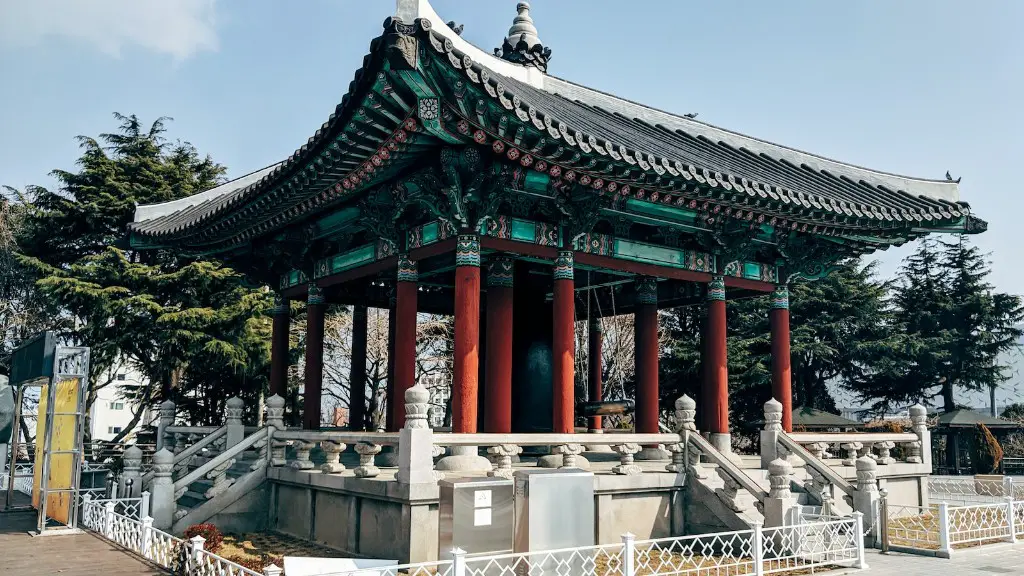China has a long and complicated relationship with North Korea, the well-known and controversial nuclear state of East Asia. This relationship is often portrayed as a strong alliance and partnership. But what is the real story behind their cooperation?
First and foremost, China and North Korea share a lengthy border and border culture, stretching back hundreds of years. In addition, there is an intertwining of political, economic, and social ties between the two. North Korea is an ally and neighbor to China, providing a valuable buffer against potential inflow of Western democratic values. In contrast, North Korea is economically dependent on China for much of its oil and food imports.
Historically, China has offered political support to North Korea. It has repeatedly vetoed UN sanctions against the regime. China has also been a key player in the ongoing Six-Party Talks, a diplomatic effort attempting to resolve the North Korean nuclear issue. So why does China still show so much support for its neighbor?
Many experts believe that China’s continued support for North Korea stems from the need for stability in the region. China does not want a collapse of the North Korean government, fearing the resulting global instability and potential refugee crisis. China is wary of a unified Korea, as it would likely be an American ally. In addition, North Korea also serves strategical interests for China as a buffer against invasions by foreign powers.
China also has some related economic interests in North Korea, as the country possesses certain resources that may be of value. For example, the country has significant deposits of coal, iron ore, and rare earth minerals. It has also become an important export market for Chinese companies, offering cheaper goods than Japan and South Korea.
Finally, China has strong ideological interests in North Korea. Unlike its neighbor South Korea, North Korea remains officially committed to communism and is considered a successful model of socialist development. This serves as a powerful symbol to Chinese citizens of the Chinese Communist Party’s perpetual leadership.
China’s Humanitarian Aspects
Although the political and economic aspects of China’s interest in North Korea have been explored, there has also been considerable focus on humanitarian aspects. China remains the primary provider of food, clothing, and medical aid to North Korea, providing assistance to hundreds of thousands of people in desperate need. In the wake of North Korea’s famine in the 1990s, China was at the forefront of providing humanitarian help.
China’s help to North Korea also extends to providing aid to its people. There have been reports of large numbers of North Korean refugees seeking asylum across the Chinese border. Despite the risks associated with refugees crossing the border and potentially becoming illegal immigrants, China accepts many of them, providing food, shelter, and medical aid. In addition, China has taken in refugees from other parts of the world, including those from Afghanistan and Syria.
Of course, China’s assistance to North Korea is not without criticism. Amnesty International has raised concerns regarding cases of North Korean refugees being forcibly repatriated back to their home country, where they face torture and death. In response to these allegations, China has stated its commitment to upholding international law and human rights, while maintaining a strong stance on not allowing illegal immigrants.
China and North Korea’s Illicit Trade
In addition to humanitarian assistance, China and North Korea have an extensive illicit trade relationship. North Korea is one of the few countries that still engages in the trade of weapons and other sensitive items. Over the years, North Korea has emerged as an exporter of missile technology, with China acting as an enabler in this illicit trade. In recent years, China has been heavily sanctioned over its continued support for North Korean weapons exports, primarily for its role in helping North Korea evade UN embargos.
The illicit trade relationship between China and North Korea is also seen in drug production and smuggling. Drugs produced in North Korea, mainly amphetamines, are smuggled into China, where they are sold to Chinese citizens at a substantial profit. In addition, North Korea is suspected of counterfeiting large amounts of U.S. currency. There is also evidence of North Korea engaging in cybercrime, targeting South Korean banks and financial institutions.
Critics of the ongoing relationship between China and North Korea express concern over China’s continued support of a rogue regime. They worry that China’s actions are enabling North Korea’s oppressive and destabilizing behavior, from weapons of mass destruction to cybercrimes.
China and North Korea’s Fading Friendship
Despite their close ties, there has been a noticeable shift in the relationship between China and North Korea in recent years. North Korea has increasingly ignored China’s calls for denuclearization and détente with South Korea. This has been seen in its nuclear tests, missile launches, and refusal to engage in diplomacy with the United States. In addition, North Korea has become increasingly reliant on Russia, while courting India and other countries in the region.
In response, China has tightened its grip on North Korea and has begun cracking down on its illicit activities. This has included suspending oil supplies, halting coal shipments, and strengthening UN sanctions. Furthermore, China is actively engaging in talks with the United States and South Korea to de-escalate cross-border tensions.
Although China remains the key ally of North Korea, its influence has become increasingly limited. This is due to a combination of North Korea’s diplomatic independence and China’s increasing economic and political commitment to the international community. While China will likely remain an important partner to North Korea, its influence may continue to wane.
North Korea’s Strategic Importance
Beyond its ideological support, China also views North Korea as strategically important. With the rise of the Trump administration in the United States and its highly aggressive stance on foreign policy in East Asia, China is concerned about the future of the region. In this context, North Korea has become an essential buffer state.
North Korea is a small yet powerful state, capable of resisting foreign aggression and maintaining influence in the region. This could be crucial in the event of a conflict with the United States, with North Korea providing a defensive line for China. It could also be useful in containing the United States’ military presence in the region, which has already begun to stagnate.
In addition, North Korea’s nuclear weapons program has proven to be a major concern for China, and strategies have been discussed on how to best contain the program. China does not want the United States to control the Korean peninsula, and is more open to the idea of a self-deterrent based strategy. This has been seen in China’s continued diplomatic efforts to de-escalate cross-border tensions, as well as its attempts to convince North Korea to pursue denuclearization.
China’s Concerns
Ultimately, China’s stance on North Korea is largely determined by its interests in the region, as well as its own security concerns. China views North Korea as an important military ally, one who can help contain the United States and provide a safe buffer against foreign incursion. In addition, China has some economic interest in the region, and does not want to see a collapse of the North Korean government. Finally, North Korea is a powerful symbol of communist ideology, and is seen by many Chinese as a successful model of socialist development.
However, China’s support for North Korea has been increasingly difficult to sustain due to the country’s provocative behavior and its ongoing illicit activities. In the face of international pressure, China has begun to reassess its relationship with the regime, emphasizing de-escalatory policies and a commitment to upholding international law. While the future of the relationship between China and North Korea is uncertain, one thing is for sure: China will continue to be a key player in the region and an important ally to North Korea.
China’s Discussion with Other Nations
China has become increasingly active in engaging with other nations in an effort to resolve the North Korean crisis. Within China, the policy of increasing diplomatic efforts has been widely discussed. China has stated its commitment to diplomatically resolving the North Korean issue, and has joined with other nations in trying to persuade North Korea to give up its nuclear weapons.
For example, China has been a key player in Six-Party Talks, which involves the United States, Russia, Japan, South Korea, and China. This has included Chinese officials engaging with North Korean counterparts in an effort to bring the regime in line with international regulations. In addition, China has been in discussions with other East Asian nations to come up with a unified strategy on how to approach the North Korean regime.
Recently, China has also been exploring economic strategies to help the North Korean economy grow and become less dependent on foreign subsidies. This includes encouraging Chinese companies to invest in the country and providing aid to North Korean companies. China has also discussed the possibility of offering North Korea special economic zones, which could give the regime access to capital and technology.
China’s increasing involvement in solving the North Korea crisis has been recognized by other countries in the region. Its diplomatic efforts have been praised, and this has led to more cooperation between China and other nations in trying to end the nuclear deadlock in the peninsula.
The Uncertain Future of North Korea
Thus far, the nuclear crisis on the Korean peninsula remains unresolved. North Korea continues to develop and test nuclear weapons, despite international condemnation and economic sanctions. In the face of this ongoing deadlock, it is unclear what the future of North Korea will be.
From China’s perspective, a peaceful and unified Korean peninsula is desirable. However, this could lead to a reduction of Chinese influence in the region, due to the potential for a unified Korea to become an ally of the United States. As such, it remains to be seen how China will approach the North Korean crisis in the future.
Given China’s long and complicated relationship with North Korea, it is unlikely that their cooperation will end anytime soon. As long as the North Korean regime continues to exist, China will likely maintain its strong alliance with the country. Ultimately, only time will tell how this relationship will evolve in the future.





